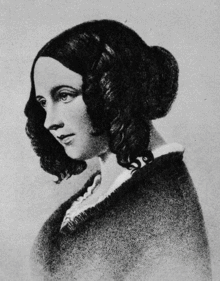You have no items in your cart. Want to get some nice things?
Go shopping
As you may have heard, 2012 is the Year of Dickens. Two hundred years ago, Charles Dickens was born, and went on to write some of the best-known novels of all time. One of his favourite topics was the Family, and so it’s not surprising to hear that he had a very large one himself. It might surprise you though, to hear that this supposed family man abandoned his wife after more than twenty years of marriage in order to carry on a relationship with a 19-year-old actress.
So, what kind of person was Dickens’ wife Catherine? The sad answer is that nobody really knows much about her. This was partly because Dickens was such a great presence—he was a born impresario who inhabited all the available space in a room and swept everyone else into the corners; but there’s also the problem of data—while Dickens was an incredibly prolific writer of letters, notes, and articles as well as novels, Catherine wasn’t much of a writer, and a lot of what she did write has been lost. She kept her emotions to herself, or at least, out of print. What remains for us to get to know her are only some dull bits of day-to-day correspondence (which Dickens has scribbled all over), some official documents, and a slightly muddly Mrs Beeton-style cookbook that sold poorly and seems to have been mainly a vanity project. Catherine Dickens, for all intents and purposes, is gone, painted right out of the picture.
That’s not to say that nobody’s been looking for her. There’s been a move, in recent years, to reclaim the lives of the wives of Great Men, and often, as in Franny Moyle’s fun biography of Constance Wilde, the results are wonderful. The efforts I’ve seen to reclaim Mrs Dickens, however, have been less successful. Sue Perkins’s biopic last December, Mrs Dickens’ Family Christmas, and Lilian Nayder’s biography. The Other Dickens, both want to find in Catherine someone to admire, or at least, pity—a kindred spirit who suffered horribly and can be sympathised with; what they find is, err… a blank. Perkins lies on a bed and stares at the ceiling, trying to understand what Catherine’s ten prolonged confinements would have been like, but she gives up after only five minutes, which is telling. Then she goes and cooks a meal from Catherine’s cookbook, which turns out to be tasty but not particularly inventive. Nayder, meanwhile, has so few of Catherine’s own words to go on that she has to turn to what everyone around her was writing about Catherine, much of which boil down to postscripts like “…and Catherine continues well too”, or even to generic explanations about women’s roles during that period.
To even begin to understand Catherine Dickens, her biographers have been forced to turn to Dickens himself, which is somewhat unfortunate under the circumstances. Nayder’s biography paints an extremely unflattering portrait of Dickens as a husband. He controlled every aspect of Catherine’s life (sometimes quite literally; one of his favourite pastimes in the early years of their marriage was putting her in mesmeric trances), belittled her self and her achievements, and possibly even blamed her for both her miscarriages and for her continuing fertility.
And poor Catherine was fertile. She went through a back-breaking twelve pregnancies in fifteen years, from which she emerged with ten children. True, Nayder may be exaggerating the case against Dickens, but from reading his novels I suspect there’s more than a grain of truth to her accusations. In a Dickens novel, the good women are virgins and the best women are both virgins and dead. Presented with a wife who was very obviously neither of those things, Dickens appears to have had difficulty coping.
When Catherine’s (virginal) younger sister Mary died in 1837, for example, Dickens turned her into an emblem of what Catherine could never be. Mary became his idea of the perfect woman, and he told Catherine so repeatedly, without sparing much of a thought for the emotions Catherine herself might have on the matter. This is where we get to the principle problem with Catherine Dickens: we’ve got no way of knowing what her thoughts actually were. Although we may imagine that she must have been angry and hurt, we can’t be sure, because she never wrote any of her feelings down.
I think I’m interested in her because she isn’t interesting, or at least, what’s left of her isn’t. The problem with Catherine, both for Dickens and for the people going in search of her today, was that she was normal. She, like most people on this planet, lived the sort of life that biographers and readers don’t get excited about. If we’re ever going to be able to work her out, we have to turn to fiction.
The best portrait of Catherine I’ve ever come across isn’t Catherine at all; it’s the character of Ellen Ash in A. S. Byatt’s Possession. As the wife of Victorian poet Randolph Ash, Ellen’s life is spectacularly underwhelming on paper. Her biographer, Beatrice, has spent most of her life reading through Ellen’s recipes and calling cards in the hopes of finding some hidden feminist sentiment, but she ends up admitting, extremely shamefaced, that Ellen Ash might have just been boring. Yet, when we read the sections of the novel about Ellen’s life, we realise that Ellen wasn’t boring at all. She was an extremely complex and secretive woman who knew about her husband’s affair and yet kept her silence, who was thoughtful and interesting but never wanted to write her thoughts down for other people to find out. I imagine that her experience wasn’t miles away from Catherine Dickens’. Of course, I’ll never know; I’m just making all this up. But this is why, I think, that fiction is so important. If Catherine’s story is ever going to be told properly, it can’t be just based on the facts. We have to use our imaginations. Dickens, after all, used his books to tell the world about the experiences of the London poor; we should be able to extend the same courtesy to his wife.

About Robin Stevens
Robin started out writing literary features for Litro and joined the team in November 2012. She is from Oxford by way of California, and she recently completed an English Literature MA at King's College, London. Her dissertation was on crime fiction, so she can now officially refer to herself as an expert in murder (she's not sure whether she should be proud of that). Robin reviews books for The Bookbag and on her own personal blog, redbreastedbird.blogspot.co.uk. She also writes children's novels. Luckily, she believes that you can never have too many books in your life.




